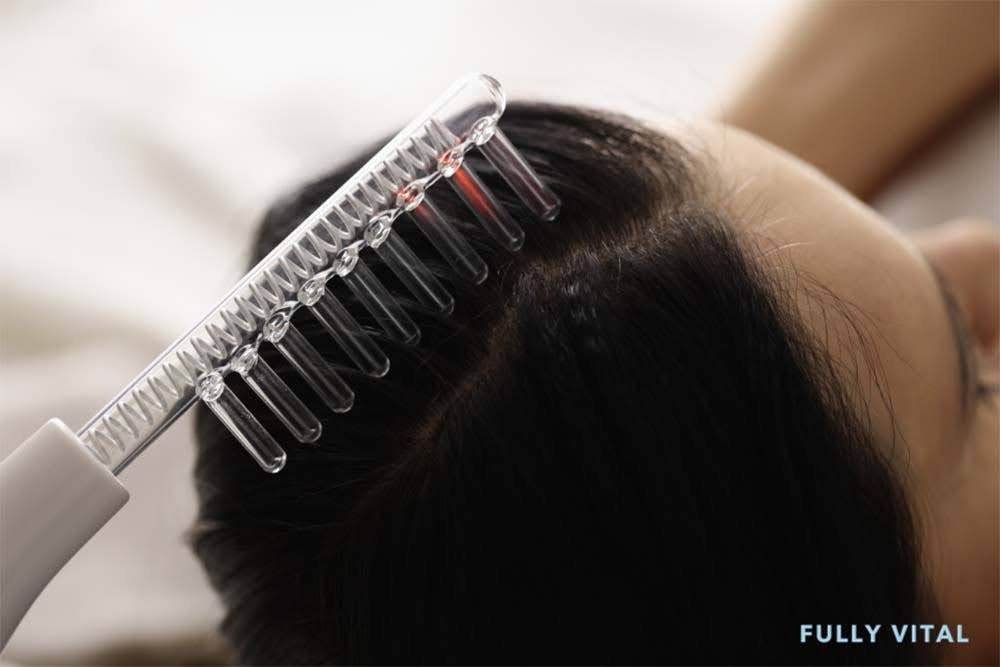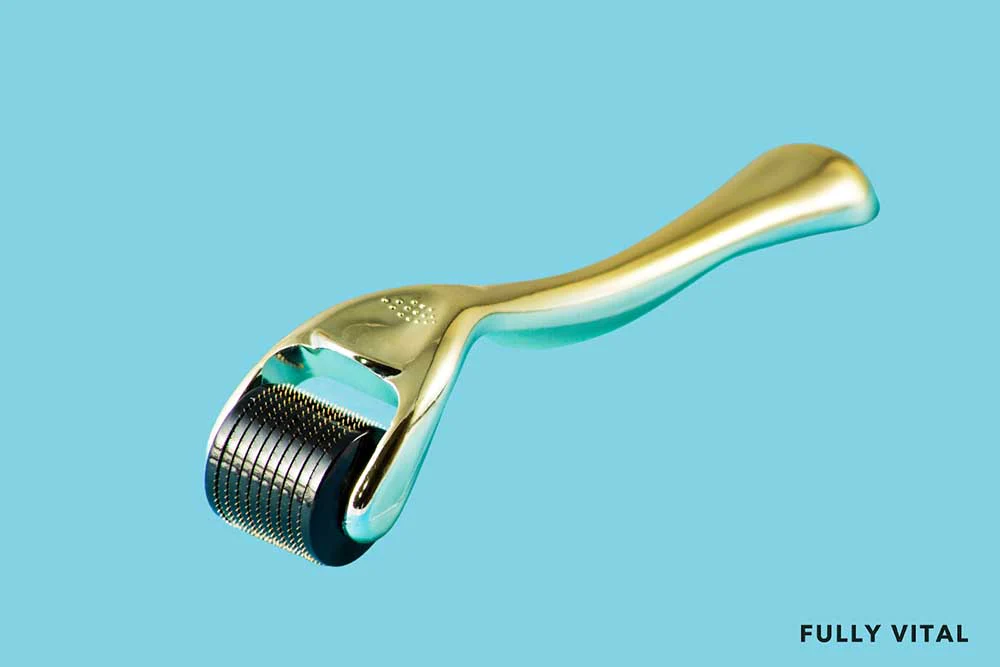
Say Goodbye To Inflamed Hair Follicles: Tips For Prevention And Relief
Inflamed hair follicles can be a frustrating and uncomfortable issue for many women, regardless of their hair type.
Whether you're dealing with inflammation due to an underlying condition or simply want to prevent it from happening, this article will provide you with helpful tips and information.
As a leading hair growth product company, we understand the importance of healthy hair follicles in stimulating hair growth and overall hair health.
Join us as we explore everything you need to know about inflamed hair follicles and how to combat them.

I LOVE MY HAIR NOW
FullyVital hair serum and hair vitamins made tremendous improvements in my hair. I truly love my hair now.
Dorit S.,
What Are Inflamed Hair Follicles?
Inflamed hair follicles, also known as folliculitis, occur when hair follicles become irritated or infected.
This condition can lead to redness, swelling, and discomfort. In severe cases, it may even cause hair loss.
Inflamed hair follicles can happen anywhere on the body where hair grows, including the scalp, face, and body.1
Why Is Awareness Of Inflamed Hair Follicles Important?
Understanding inflamed hair follicles is crucial for effective prevention and treatment.
By knowing the causes, symptoms, and risk factors, you can take proactive measures to maintain healthy hair follicles and prevent future inflammation.
Awareness also helps in timely intervention, reducing the chances of hair loss and scarring associated with severe cases of inflamed hair follicles.
What Causes Inflamed Hair Follicles?
Inflamed hair follicles can be caused by a variety of factors, including:
- Bacterial or fungal infections: Microorganisms such as bacteria or fungi can enter the hair follicles, leading to inflammation.
- Poor hygiene: Infrequent washing of the hair and scalp can create an environment conducive to bacterial growth, increasing the risk of inflamed hair follicles.
- Ingrown hairs: When a hair curls back or grows sideways into the skin, it can cause inflammation around the follicle.
- Friction or irritation: Constant rubbing or excessive pressure on the hair follicles, often caused by tight hairstyles or certain hair accessories, can lead to inflammation.
Symptoms Of Inflamed Hair Follicles
Recognizing the symptoms of inflamed hair follicles is crucial for early intervention.
Common symptoms include:
- Redness and swelling around the hair follicles
- Itching and discomfort
- Pus-filled bumps or pustules
- Skin tenderness or sensitivity
- Formation of crusts or scabs
Common Triggers For Inflamed Hair Follicles
Certain triggers can increase the likelihood of developing inflamed hair follicles.
These include:
- Excessive sweating: Sweat can contribute to the growth of bacteria and fungi on the scalp, leading to inflammation.
- Hormonal changes: Fluctuations in hormone levels, such as those experienced during menstruation or menopause, can make the hair follicles more susceptible to inflammation.
- Environmental factors: Exposure to harsh chemicals, pollutants, or allergens can irritate the hair follicles and trigger inflammation.

How To Prevent Inflamed Hair Follicles
Prevention is key when it comes to avoiding inflamed hair follicles.
Here are some tips to minimize the risk:
Maintain good hygiene
Regularly wash your hair and scalp to remove dirt, excess oil, and bacteria that can contribute to inflammation.
Avoid tight hairstyles
Opt for loose or gentle hairstyles that don't put excessive tension on the hair follicles.
Clean hair accessories
Regularly wash or disinfect hair brushes, combs, and hair ties to prevent the buildup of bacteria.
Avoid sharing personal items
Sharing hats, towels, or hair accessories with others can potentially transfer bacteria and increase the risk of inflammation.
Wear breathable fabrics
Choose clothing and hats made of lightweight and breathable materials to minimize sweat and irritation on the scalp.
Use quality hair products
Opt for products that are gentle, sulfate-free, and suitable for your hair type to avoid scalp irritation.
Medical Treatments For Inflamed Hair Follicles
When home remedies are not enough, medical treatments can help alleviate inflamed hair follicles. Consult a dermatologist for appropriate treatment options, which may include:
Topical antibiotics
Antibacterial creams or ointments can help control bacterial infections and reduce inflammation.2
Oral antibiotics
In severe cases, oral antibiotics may be prescribed to address the underlying infection.
Antifungal medications
For folliculitis caused by fungal infections, antifungal medications may be prescribed.3
Corticosteroids
These anti-inflammatory drugs can be used to reduce swelling and irritation.
Laser or light therapy
Certain types of folliculitis can be treated with laser or light therapy, which target the hair follicles and reduce inflammation.4

Home Remedies For Relieving Inflamed Hair Follicles
If you prefer natural remedies or just want to complement medical treatments, consider these home remedies for relieving inflamed hair follicles:
- Tea tree oil: Dilute tea tree oil with a carrier oil and apply it to the affected area to soothe inflammation and fight bacteria.
- Aloe vera: Apply aloe vera gel to the inflamed follicles to reduce redness, swelling, and itchiness.
- Warm compress: Place a warm, damp cloth or towel on the affected area to decrease inflammation and promote healing.
- Witch hazel: Apply witch hazel topically to calm irritated hair follicles and reduce inflammation.
Tips For Managing Chronic Inflamed Hair Follicles
Chronic inflamed hair follicles can be challenging to manage.
Here are some tips to help you cope with this ongoing condition:
- Maintain a consistent hair care routine: Regularly cleanse and moisturize your hair and scalp to minimize the risk of inflammation.
- Avoid excessive heat styling: Heat styling tools can further irritate inflamed hair follicles, so limit their use or opt for heat-free styling methods.
- Be mindful of your stress levels: High stress levels can worsen inflammation, so practice stress-management techniques like meditation or exercise.
- Consult a dermatologist: If chronic inflammation persists or worsens despite home remedies, seek professional guidance for a personalized treatment plan.
What Are The Benefits Of Preventing Inflamed Hair Follicles?
Taking steps to prevent inflamed hair follicles can offer several benefits, including:
- Reduction in discomfort and pain: Preventing inflammation can help alleviate any itching, tenderness, or pain associated with inflamed hair follicles.
- Promotion of healthy hair growth: By maintaining the health of your hair follicles, you can stimulate hair growth and improve the overall appearance and thickness of your hair.
- Prevention of hair loss: Severe cases of inflamed hair follicles can lead to permanent hair loss. Preventing inflammation can help safeguard against this outcome.
Transform Your Hair With Fully VitalRegain your confidence and embrace a healthier, more vibrant mane with Fully Vital's science-backed hair growth products. Unlock the Potential of Your Hair:
At Fully Vital, our mission is to create powerful hair growth products that are scientifically formulated to slow down and reverse the aging process of your hair. Experience the transformative power of Fully Vital and take control of your hair's future today! |
Final Thoughts On Inflamed Hair Follicles
Inflamed hair follicles can be a frustrating and uncomfortable condition that affects the health and appearance of our hair.
By understanding the causes, symptoms, and preventative measures, we can take proactive steps to maintain healthy hair follicles and promote optimal hair growth.
As a leading hair growth product company, we are dedicated to providing solutions for inflamed hair follicles.
At Fully Vital, we offer a range of hair growth products designed to combat the aging of hair and promote a healthy relationship with your locks.
Our products are formulated with natural ingredients and backed by scientific research to ensure their effectiveness.
By incorporating our hair growth products into your hair care routine, you can support the health of your hair follicles and enjoy vibrant, beautiful hair.
Remember, prevention is key in avoiding inflamed hair follicles.
Maintain good hygiene, be mindful of potential triggers, and seek professional advice when needed.
Say goodbye to inflamed hair follicles and say hello to a healthier, more vibrant head of hair.
Frequently Asked Questions About Inflamed Hair Follicles
What ointment is good for folliculitis?
When it comes to choosing an ointment for folliculitis, it's best to consult with a dermatologist.
They can recommend appropriate topical treatments based on the severity and underlying cause of your inflamed hair follicles.
Some commonly prescribed ointments for folliculitis include antibiotic creams or gels, antifungal creams, and corticosteroid creams.
What makes folliculitis worse?
Several factors can worsen folliculitis, including:
- Irritation from tight clothing or accessories
- Continued exposure to hot and humid environments
- Using harsh or irritating hair care products
- Scratching or picking at the affected area
- Poor personal hygiene
What do unhealthy hair follicles look like?
Unhealthy hair follicles may exhibit the following characteristics:
- Redness and inflammation around the follicle
- Appearance of small pustules or bumps
- Itching or discomfort
- Oozing or crusting
- Abnormal hair growth patterns
Can you pop hair folliculitis?
It is not recommended to pop or squeeze hair folliculitis as it can worsen the inflammation and potentially lead to infection or scarring.
If the condition does not improve or is causing significant discomfort, it is best to consult a dermatologist for appropriate treatment.
How do you know if folliculitis is bacterial or fungal?
Determining whether folliculitis is bacterial or fungal usually requires a medical diagnosis.
A dermatologist can examine the affected area, take a swab for culture, or perform other diagnostic tests to identify the specific cause of the folliculitis.
This information will help guide the appropriate treatment plan.
What antibiotic kills folliculitis?
The choice of antibiotic depends on the type and severity of the folliculitis.
Commonly prescribed antibiotics for bacterial folliculitis include:
- Clindamycin
- Dicloxacillin
- Cephalexin
- Trimethoprim-sulfamethoxazole
It's important to follow the dermatologist's instructions and complete the full course of antibiotics to effectively kill the bacteria causing the inflammation.
What autoimmune inflamed hair follicles?
Autoimmune disorders such as lupus or follicular mucinosis can lead to inflamed hair follicles.
In these conditions, the immune system mistakenly attacks the hair follicles, causing inflammation and hair loss.
Diagnosis and treatment of autoimmune-related inflamed hair follicles require the expertise of a dermatologist or other healthcare specialists.
Do inflamed hair follicles go away?
Inflamed hair follicles can go away on their own, especially if they are mild and not persistent.
Practicing good hygiene, avoiding irritants, and implementing preventive measures can help resolve the inflammation.
However, severe or chronic cases may require medical treatment to fully address the underlying cause and provide relief.
What kills folliculitis naturally?
While natural remedies cannot completely replace medical treatments, certain remedies may help relieve symptoms and promote healing.
Consider the following natural options:
- Tea tree oil: Dilute tea tree oil with a carrier oil and apply it to the affected area for its antimicrobial and anti-inflammatory properties.
- Aloe vera: Apply aloe vera gel topically to soothe inflammation and promote healing.
- Warm compress: Applying a warm compress can help reduce swelling and relieve discomfort.
- Apple cider vinegar: Dilute apple cider vinegar with water and use it as a rinse or apply it topically to combat bacterial or fungal infections.
Can folliculitis spread by scratching?
Yes, scratching the inflamed hair follicles can contribute to the spread of folliculitis.
Scratching can break the skin, allowing bacteria or fungi to enter and infect neighboring hair follicles.
It's important to avoid scratching and to practice proper hygiene to prevent the spread of infection.
Remember, when treating or managing inflamed hair follicles, it is always best to consult a healthcare professional for an accurate diagnosis and appropriate treatment plan.
Sources:
- What Is Folliculitis? (n.d.). WebMD. https://www.webmd.com/skin-problems-and-treatments/what-is-folliculitis
- Bandyopadhyay, D. (2021). Topical Antibacterials in Dermatology. Indian Journal of Dermatology, 66(2), 117–125. https://doi.org/10.4103/ijd.IJD_99_18
- McKeny, P. T., & Zito, P. M. (2019, November 12). Antifungal Antibiotics. Nih.gov; StatPearls Publishing. https://www.ncbi.nlm.nih.gov/books/NBK538168/
- Folliculitis - Diagnosis and treatment - Mayo Clinic. (n.d.). Www.mayoclinic.org. https://www.mayoclinic.org/diseases-conditions/folliculitis/diagnosis-treatment/drc-20361662







